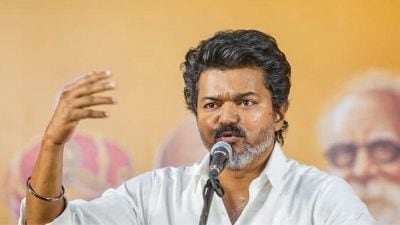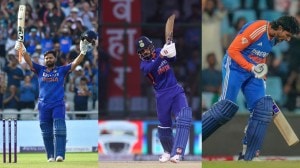From the dark shadows of Assam agitation, poster boy Prafulla Mahanta sees light: clean chit on ‘secret killings’
Both Mahanta and the "gupto hatya" between 1998 and 2001 when he was CM — of relatives or sympathisers of ULFA militants by masked men — have now receded into history
 Former Assam chief minister Prafulla Mahanta was cleared of all charges in the “secret killings” case. (Express photo)
Former Assam chief minister Prafulla Mahanta was cleared of all charges in the “secret killings” case. (Express photo) Sixteen years after an inquiry commission report had indicted former Assam chief minister Prafulla Mahanta for being instrumental in a series of “secret killings” — extra-judicial killings of family members of ULFA militants between 1998 and 2001 — the Gauhati High Court cleared him of all charges on Monday, while upholding its 2018 order on the matter.
In September 2018, the court had quashed the constitution of the K N Saikia inquiry commission (which had indicted Mahanta in its 2007 report). However, an interlocutory application (IA) had been filed by Rajya Sabha MP Ajit Kumar Bhuyan and Ananta Kalita, challenging the order. On Monday, the division bench of Chief Justice Sandeep Mehta and Justice Mitali Thakuria, dismissed their application, observing that the petitioners had filed it 531 days after the court’s earlier verdict, and failed to “convincingly appeal” the gross delay in filing it. They also made “inconsistent and contradictory pleadings in the three affidavits”, the order observed.
 Prafulla Mahanta (extreme right) with Tarun Gogoi (extreme left) at a 2018 protest dharna against the CAA in Guwahati. (Express photo by Dasarath Deka, file)
Prafulla Mahanta (extreme right) with Tarun Gogoi (extreme left) at a 2018 protest dharna against the CAA in Guwahati. (Express photo by Dasarath Deka, file)
The 70-year-old Mahanta and his family members welcomed the High Court’s order absolving his name.
Between 1998 and 2001, there were a series of extra-judicial killings — infamous as the “secret killings” or “gupto hatya” of Assam — in which close relatives or sympathisers of known ULFA militants were shot dead by unidentified killers, usually masked men, in the dead of the night, as part of a counter-insurgency strategy.
Ananta Kalita, who filed the IA along with Rajya Sabha MP Bhuyan, had himself survived a shootout over his alleged ULFA links in 1999.
These killings, which rocked Assam when the Mahanta-led Asom Gana Parishad (AGP) — now a BJP ally — was in power, were probed by at least four panels, under various judges: Justice Shafiqul Haque, Justice Meera Sarma, Justice J N Sarma Commission and finally, the Justice Saikia Commission, which submitted its report in 2007.
Without naming any individual, the Saikia Commission’s report alleged a nexus between the police and certain surrendered ULFA members to carry out the killings, and described the same as “remote-orchestrated” by higher authorities. Mahanta, who was then the CM, also held the Home portfolio at the time.
The Congress made it a poll issue during the 2001 Assembly elections which, many say, contributed to its landslide victory over the AGP.
In 2008, Mahanta appealed to the High Court, challenging the legality of the Saikia Commission. In 2018, the court held that the panel was legally untenable, since it was constituted when the previous panel (J N Sarma Commission) was still active.
Reacting to the order, Mahanta told reporters in Guwahati that he was “thankful” to the court. “I thank the court for bringing out the truth. These accusations were part of a conspiracy by politicians to malign my image,” he said.
Mahanta, who has been ill over the last year or so and away from active politics, has had a chequered career. He began it on a high, when in 1985, the student leader became one of India’s youngest chief ministers at 33. The AGP, the party he founded as the political front of the All Assam Students’ Union (AASU) — which had led the anti-“foreigner” Assam agitation of the early 1980s — came to power with a landslide victory over the Congress.
However, Mahanta’s tenure was beset with allegations of corruption and violence, alongside the rise of the separatist ULFA, and came to an end in 1990 with the imposition of President’s Rule. He became CM for a second term in 1996, but this tenure was mired in the controversy over the “secret killings”, besides other corruption scandals.
Over the last decade, the poster boy for Assamese nationalist politics has been gradually sidelined, especially since 2016, when the BJP came to power, with the AGP and the Bodoland People’s Front as its allies.
Mahanta seemed to be back in the picture in 2018, when the noise around the Citizenship (Amendment) Act (then Bill) reached a crescendo, and had even founded a forum to protest against the legislation. If the Assam agitation that propelled Mahanta to prominence rested entirely on a campaign against people seen as “foreigners”, the CAA that seeks to provide faster citizenship to certain categories of immigrants was seen as entirely contradictory in principle.
But in 2021, Mahanta’s isolation was complete, after the AGP denied him a ticket to contest from Barhampur, a constituency he had represented seven consecutive times since 1999. Since then, the former hero of Assam has virtually retreated from political life.
With PTI inputs








- 01
- 02
- 03
- 04
- 05























